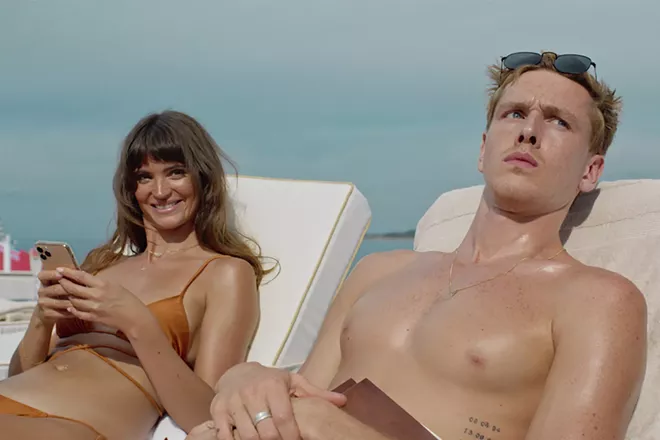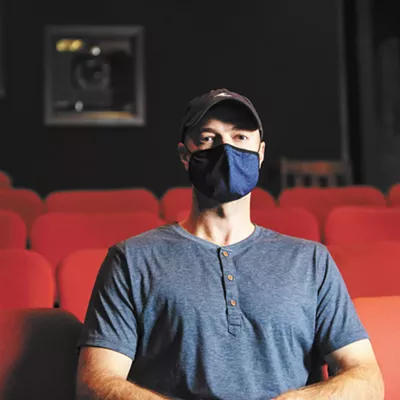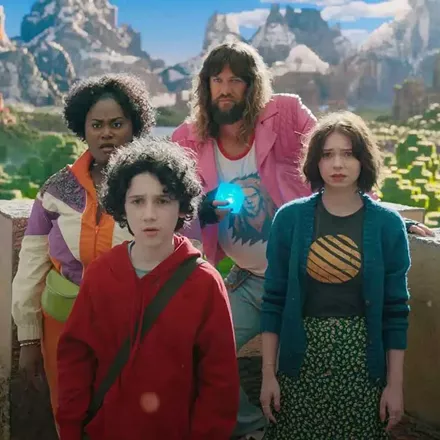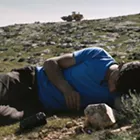Midway through the nearly 2½-hour endurance test that is Triangle of Sadness, something explosive begins to happen. Aboard a disgustingly expensive yacht populated by even more distasteful people, choppy waters have turned an extravagant dinner being served into a digestive weapon that is wreaking havoc on the wealthy diners from the inside out. It is a sequence of uproarious upchuck and delirious defecation that serves as a high point in an otherwise superficial slog of a film that attempts to be a class satire, but comes off as a scattered spoof that drowns in a vast ocean of its runtime.
Split into three parts, the film actually begins before any of the characters arrive on the yacht. The initial protagonists of this wannabe parable are the model couple of the insecure Carl (Harris Dickinson, who also appeared in this year's similarly shallow See How They Run) and the carefree Yaya (the late Charlbi Dean, who proves to be one of the standout performers). A dragged-out dinner scene sees the two getting into a disagreement over who should pick up the check, which continues to escalate into an awkward car ride and a comedic enough confrontation at an elevator. They manage to put this aside and go on a yacht trip Yaya has been gifted for the work she does as an Instagram influencer.
Thus begins the start of an occasionally humorous string of events that seek to highlight the power the wealthy guests hold over the diligent crew who are instructed to always say yes to them. Cross them, even accidentally, and you are banished from the ship never to be seen again. It is all very clear cut to the point of being oddly safe, and the film rapidly starts to feel like it is straining to make some sort of deeper meaning out of this. It calls attention to the social expectations placed on the workers without, at least initially, caring to explore much about who the crew actually are beyond basic sketches.
We do meet the character of Abigail, played by a delightful Dolly De Leon, who is a background figure for far too long, but emerges as being absolutely central to the film. There is also the ship's perpetually drunken captain, played by an expert in inebriation, Woody Harrelson. He's in rare form, as he wanders in for the aforementioned spectacle to provide some laughs, only to soon exit. The film ends up feeling akin to the recent HBO series The White Lotus in its middle section, but never offers any additional layers to draw viewers into the remaining hour of the movie, which twists itself into narrative knots that offer diminishing returns.
Swedish writer/director Ruben Östlund, whose 2014 film Force Majeure remains infinitely sharper and funnier than anything taking place here, does offer up some promising pieces in isolation and an ending that actually shows some narrative gumption. Unfortunately, the film subsequently runs away from this rather abruptly and leaves everything on a hollow note. It ought to have sat with this finale and trimmed out the meandering buildup to leave it time to breathe. Instead, it all passes too quickly and disappointingly flinches from facing down its full grim potential.
That the film still took this year's Palme d'Or, the highest award given at Cannes, is not wholly unsurprising. After all, Östlund had previously won over jurors with The Square, his similarly lackluster and overlong 2017 film. However, the film that kept echoing through Triangle of Sadness was not any of his prior works, but the 2019 Palme d'Or winner Parasite. This film gestures at similar ideas though can only wish it packed one iota of the humor and incisiveness that the still incredible South Korean work possesses. While that is a high bar to clear, Triangle of Sadness never attempts to make the leap, instead dragging itself to a long overdue end. ♦

























